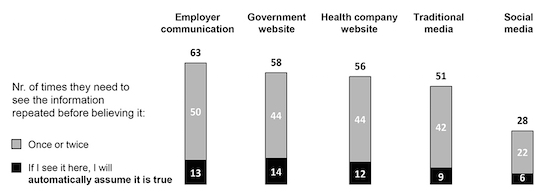The private sector plays a vital role in informing the public on the coronavirus (COVID-19) pandemic, as employees place considerably more trust in their employers to accurately communicate the crisis compared to government and the media, and expect frequent updates regarding coronavirus-related health and workplace policies, according to a new report by Edelman.
Edelman’s COVID-19 report, a special edition of the agency’s annual Trust Barometer Report, found that employers are seen as the most credible source for coronavirus-related communication: 63 percent of global respondents said they’ll believe information provided to them by their employers after seeing that information repeated two times, compared to 58 percent for a government website, 56 percent for a health company website, 51 percent for traditional media and 28 percent for social media.
More respondents (13 percent) said they'll automatically assume coronavirus information provided to them by their employers is true, beating all other communications channels with the exception of government websites, which ranked as the most credible channel (14 percent).
 Percent who report they believe coronavirus information from each source. Percent who report they believe coronavirus information from each source. |
Nearly two thirds (62 percent) of respondents said they trust their employer to respond effectively and responsibly to the coronavirus outbreak, beating out the government, NGOs, the media, schools and educational institutions and private or government-run health insurance companies. In almost all of the 10 countries polled—with the exception of Germany and Canada—respondents ranked “my employer” as better prepared for the virus than “my country.”
The news media still wins in terms of overall exposure: 64 percent of respondents said they get most of their coronavirus-related updates from major news outlets. Young people (18 to 34) rely on a mix of social media (54 percent) and mainstream news (56 percent) to keep them informed of the crisis, while older people (55 and up) rank mainstream media as nearly three times more trustworthy than social media (71 percent vs. 25 percent, respectively). Nearly three-quarters (74 percent) of all respondents said they’re concerned about fake news and misinformation surrounding the crisis.
The Edelman report also found that scientists and doctors—along with WHO and CDC officials— rate among the most trusted COVID-19 spokespersons, achieving trust scores ranging from 68 to 83 percent. Employer CEOs came in at 54 percent. Government officials and journalists both ranked lowest, each with under 50 percent trust.
Americans have placed high expectations on their employers to respond to the coronavirus crisis and communicate regularly what measures they're taking to ensure the health and safety of employees: 78 percent said they expect businesses to act to protect employees and local communities, 63 percent said they want daily updates on COVID-19, 57 percent want clarity on how many colleagues have contracted the virus and 53 percent want information regarding how the virus is affecting their organization’s ability to operate.
A separate March survey by G&S Business Communications found that more than three-quarters (77 percent) of employed Americans think their company is doing a good job communicating with staff about COVID-19, and 40 percent say they’re “very satisfied” with coronavirus-related communication they’ve received from their employers. More than half (55 percent) claim their company has communicated with staff regarding coronavirus policies on at least a daily basis in the last week.
Edelman’s study surveyed 1,000 people in Brazil, Canada, France, Germany, Italy, Japan, South Africa, South Korea, the U.K. and the U.S. between March 6 and March 10.


 There’s a fine line between newsjacking and taking advantage, aka ambulance chasing. Our job as PR professionals is to tread it carefully.
There’s a fine line between newsjacking and taking advantage, aka ambulance chasing. Our job as PR professionals is to tread it carefully. PR firms need to be mindful of ways their work product may be protected by the attorney-client privilege whenever working with a client’s internal legal team or its external legal counsel.
PR firms need to be mindful of ways their work product may be protected by the attorney-client privilege whenever working with a client’s internal legal team or its external legal counsel. Manuel Rocha, former US ambassador and intenational business advisor to LLYC, plans to plead guilty to charges that he was a secret agent for Cuba.
Manuel Rocha, former US ambassador and intenational business advisor to LLYC, plans to plead guilty to charges that he was a secret agent for Cuba. CEO mentoring is an often-overlooked aspect of why CEOs are able to make good decisions, and sometimes make bad ones—all of which intersects with the role and duties of a board.
CEO mentoring is an often-overlooked aspect of why CEOs are able to make good decisions, and sometimes make bad ones—all of which intersects with the role and duties of a board.  How organizations can anticipate, prepare and respond to crises in an increasingly complex world where a convergent landscape of global challenges, threats and risks seem to arrive at an unrelenting pace.
How organizations can anticipate, prepare and respond to crises in an increasingly complex world where a convergent landscape of global challenges, threats and risks seem to arrive at an unrelenting pace.


 Have a comment? Send it to
Have a comment? Send it to 
No comments have been submitted for this story yet.